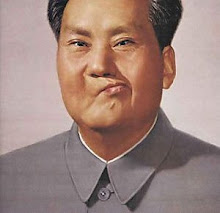
Also known as "Spring Festival", Chinese New Year (CNY) is the one time in the year where Chinese people give out money, eat special food, and adorn their houses with red and gold decorations.
For non-Chinese observers, this celebration can be compared to Christmas in many ways. Like Christmas, there is gift giving, copious amounts of food and family visits.
While there isn't a gift exchange involving boxes of material items, there is an exchange of something of far greater importance to Chinese people...cash (to be discussed in a later post). Small red envelopes are filled with various denominations of cash, depending on how much you like/love the receiving individual, and whether they deserve it or not. Getting money from rich grandma? Lucky! Getting money from a distant relative that you only see once a year? Not so much. It should be also noted that Chinese children will routinely tally up and compare their cash intake. The two most popular categories are 'highest total gross' and 'single highest take'. This is to prepare them for their future careers in finance and/or accounting.
Like gifts, food is an integral part of the CNY celebrations. Similar in concept to a Christmas dinner, a CNY dinner consists of a myriad of foods that are eaten not for their rich flavours, but more for the supposed luck, prosperity and longevity (herein known as the CNY trifecta) they will bring. As Chinese people are highly susceptible to superstition, certain foods are eaten to increase the chances of good health and bountiful harvests of cash in the new year. Some items include steamed fish, cakes made of taro and turnip, dumplings and noodles. Whether consumption of these foods truly brings the desired or purported effects remains to be seen. Research thus far has been unable to provide a clear correlation.
Family visits, no matter the ethnicity can always be a risky affair. However, Chinese family visits during New Years are typically a good time and grievances will rarely be aired, unlike non-Chinese Thanksgiving. This can be attributed to a strict adherence to the philosophies of non-confrontation and passive-agressiveness (to be discussed in a later post). During these visits, traditional four word expressions relating to the CNY trifecta are said in order to wish others a happy new year. For Chinese children, these expressions are memorized well in advance and are repeated ad nauseam during the festival's length. Success in this task will help them survive the gauntlet of relatives and allow them to claim their cash prizes.
For many non-Chinese, CNY is a non-event as the occasion often comes and goes without much fanfare. For non-Chinese looking to participate, there are two ways to participate.
1. Go to the local Chinese buffet/restaurant to check out the "special" CNY dishes
2. Find a Chinese person/friend and tell them "Gung Hei Fat Choy!" (traditional New Year wish for success and prosperity)
Option 2 is typically the preferred option as it requires no cost and the least amount of effort. Should you attempt this, It is highly recommended that the expression is spoken with the most horrendous mispronunciation possible. This provides an excellent opportunity for the Chinese person to correct your pronunciation and feel better about their own mastery of the Chinese language. If anything, they'll just be happy you tried.




First!
ReplyDelete